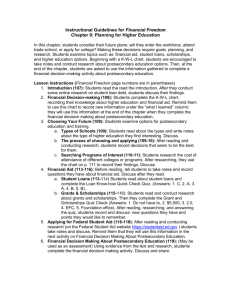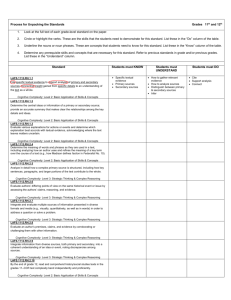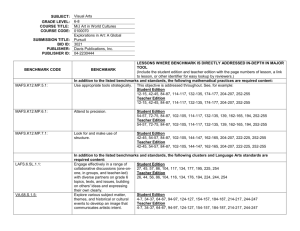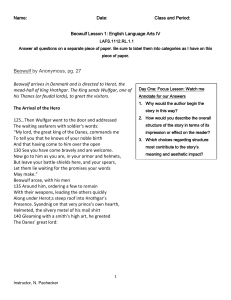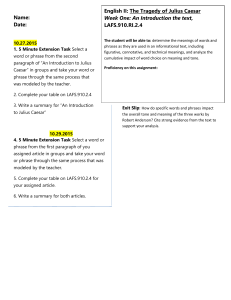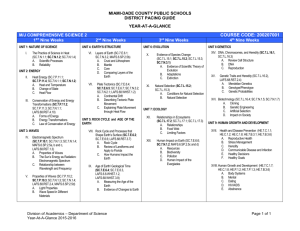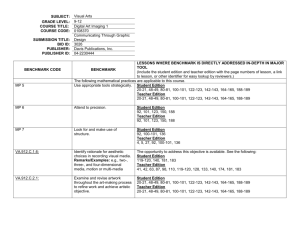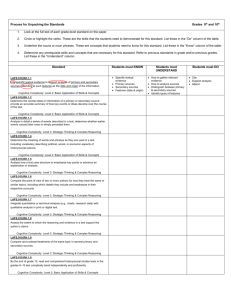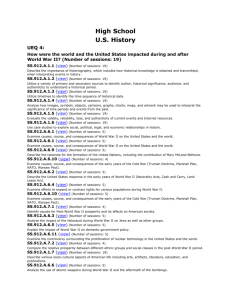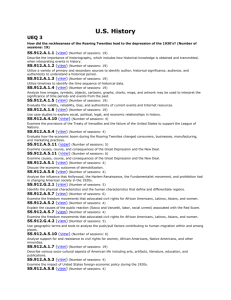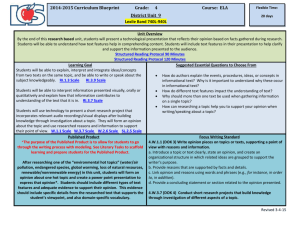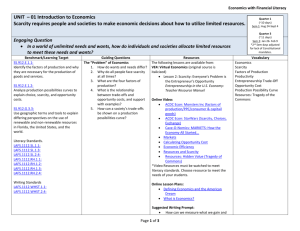Unit 3
advertisement
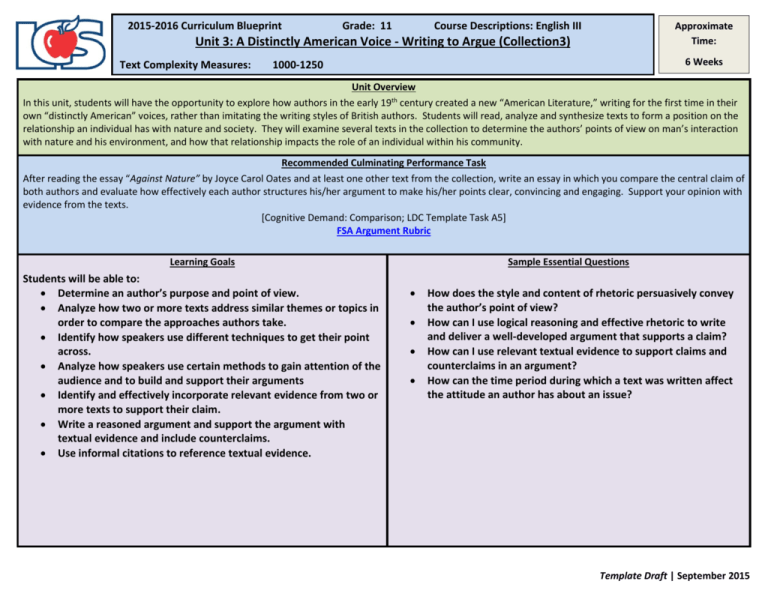
2015-2016 Curriculum Blueprint Grade: 11 Course Descriptions: English III Approximate Time: Unit 3: A Distinctly American Voice - Writing to Argue (Collection3) Text Complexity Measures: 6 Weeks 1000-1250 Unit Overview In this unit, students will have the opportunity to explore how authors in the early 19th century created a new “American Literature,” writing for the first time in their own “distinctly American” voices, rather than imitating the writing styles of British authors. Students will read, analyze and synthesize texts to form a position on the relationship an individual has with nature and society. They will examine several texts in the collection to determine the authors’ points of view on man’s interaction with nature and his environment, and how that relationship impacts the role of an individual within his community. Recommended Culminating Performance Task After reading the essay “Against Nature” by Joyce Carol Oates and at least one other text from the collection, write an essay in which you compare the central claim of both authors and evaluate how effectively each author structures his/her argument to make his/her points clear, convincing and engaging. Support your opinion with evidence from the texts. [Cognitive Demand: Comparison; LDC Template Task A5] FSA Argument Rubric Learning Goals Students will be able to: Determine an author’s purpose and point of view. Analyze how two or more texts address similar themes or topics in order to compare the approaches authors take. Identify how speakers use different techniques to get their point across. Analyze how speakers use certain methods to gain attention of the audience and to build and support their arguments Identify and effectively incorporate relevant evidence from two or more texts to support their claim. Write a reasoned argument and support the argument with textual evidence and include counterclaims. Use informal citations to reference textual evidence. Sample Essential Questions How does the style and content of rhetoric persuasively convey the author’s point of view? How can I use logical reasoning and effective rhetoric to write and deliver a well-developed argument that supports a claim? How can I use relevant textual evidence to support claims and counterclaims in an argument? How can the time period during which a text was written affect the attitude an author has about an issue? Template Draft | September 2015 Cluster of Priority Standards Speaking and Listening Reading LAFS.1112.SL.1.1 (DOK 3) Initiate and participate effectively in a range of collaborative discussions (oneon-one, in groups, and teacher-led) with diverse partners on grades 11–12 topics, texts, and issues, building on others’ ideas and expressing their own clearly and persuasively. LAFS.1112.R.1.2 (DOK 3) Determine two or more themes or central ideas of a text and analyze their development over the course of the text, including how they interact and build on one another to produce a complex account; provide an objective summary of the text. LAFS.1112.SL.2.4 (DOK 3) Present information, findings, and supporting evidence, conveying a clear and distinct perspective, such that listeners can follow the line of reasoning, alternative or opposing perspectives are addressed, and the organization, development, substance, and style are appropriate to purpose, audience, and a range of formal and informal tasks. LAFS.1112.R.2.6 (DOK 3) Determine an author’s point of view or purpose in a text in which the rhetoric is particularly effective, analyzing how style and content contribute to the power, persuasiveness or beauty of the text. Language Writing LAFS.1112.W.1.1 (DOK 4) Write arguments to support claims in an analysis of substantive topics or texts, using valid reasoning and relevant and sufficient evidence. LAFS.1112.L.3.5 (DOK 3) Demonstrate understanding of figurative language, word relationships, and nuances in word meanings. Link to Webb’s DOK Guide Template Draft | September 2015 SAMPLE ASSIGNMENTS Priority Texts “Song of Myself” Walt Whitman Poetry Lexile: NA Focus Standard: LAFS.K12.R.2.6 Critical Vocabulary: project, settlement, divergence, ferment, regimen, defection, stoically Language and Style: LAFS.1112.L.2.3, Parallel Structure, p. 186 “Against Nature” Joyce Carol Oates Essay Lexile: 1000 Focus Standard: LAFS.1112.R.2.5 Critical Vocabulary: resonance, autonomy, evidently, transcending, tangentially, harbingers Language and Style: LAFS.1112.L.1.2, Quotations from Walden, Henry David Thoreau Essay Lexile: 1250 Focus Standard: LAFS.1112.R.2.6 LAFS.1112.RL.1.2; LAFS.1112.SL.1.1: “Song of Myself” (p. 183) – Collaborative Discussion: How is Whitman’s poetry a departure from the style and subjects of other poems you have read? With a partner, discuss what make Whitman’s poetry unique. Cite specific textual evidence from “Song of Myself” to support your ideas. LAFS.1112.W.4.10; LAFS.1112.SL.1.1; LAFS1112.RI.1.2; LAFS1112.L.3.5; : Walden (p. 217) – Have students choose partners and use the bulleted strategies on page 217 to help them write a short summary of each excerpt. For each excerpt, ask pairs to share their summaries with the class and write the most concise and accurate summary on the board. Lead a class discussion in which students use the summaries of individual essays to determine the central idea of the entire work. LAFS.1112.W.1.2; LAFS1112.W.3.7; LAFS.1112.SL.1.1 : “Against Nature” (p. 231) – Have students work in groups to identify and discuss Wilde’s main idea and supporting details. Then have them list Oates’ central ideas and compare them with the Wilde passage. Students should work independently to draft their analysis (extended response) and then regroup to share their analysis. Conduct a class discussion to discuss the views of Wilde and Oates. ADDITIONAL RESOURCES OPTIONAL TEXTS Poems by Emily Dickinson Poetry Lexile: N/A Focus Standard: LAFS.1112.R.2.5 Critical Vocabulary: indeterminate, lucid, tumultuous, supposition, insuperable, prostrate, pertinacity, averted HMHFYI: interesting articles, audio on issues and information related to the content in the unit. Close Read screencasts from “Song of Myself,” p. 177 TE or Resources tab/icons in e-book Close Reader Practice and Apply: Determining Themes. P. 186b TE Level Up Tutorials: Figurative language, Universal and Recurring Themes, Summarizing, : Resources, Tab Online TE Online Assessments for selections: Resources Tab, Online TE Biographies of authors: Resources Tab, Online TE Walden/Thoreau/Emerson/Transcendentalism Resources: http://www.shmoop.com/walden-thoreau/resources.html History Channel Video Template Draft | September 2015
